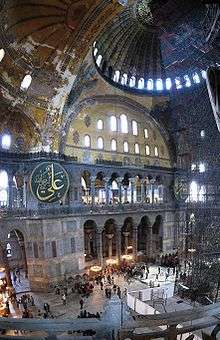Paul the Silentiary

Paul the Silentiary, also known as Paulus Silentiarius (Greek: Παῦλος ὁ Σιλεντιάριος, d. Constantinople, 575-580 AD), was a Greek poet. His contemporary, the historian and poet Agathias, describes him as a rich man and a 'Silentiary' or palace official of Justinian I at Constantinople. (This title has been taken to indicate that he was responsible for silence in the palace.)
Paul is best known and most admired for his short poems in the classical tradition, about 80 of which have been preserved in the Greek Anthology. Forty of these are love poems. Two are replies to poems by Agathias; in another Paul laments the death of Damocharis of Cos, Agathias's favorite pupil. These short poems also contain interesting social information.
He also composed in verse an ecphrasis or evocative account of Justinian's cathedral of the Holy Wisdom (Hagia Sophia), describing its architecture and decoration after the reconstruction of the dome in 562. Paul sees the church as a 'meadow' of many-coloured marbles, and helps us to imagine the church before its many subsequent remodellings. The poem was probably commissioned by Justinian himself, and Paul had to read verses to the emperor through the inauguration. It consists of 1029 verses in Greek, starting with 134 lines of iambic trimeter, with the remainder in the classical meter of epic, dactylic hexameter.
He also wrote a poem about the hot springs at Pythia.
Paul died some time between 575 and 580.
Works of Paul the Silentiary
- Paul the Silentiary, Paolo Silenziario Epigrammi, tr. G. Viansino (1963) [Greek text with Italian translation]
- Paul the Silentiary, Paulus Silentiarius Descriptio Sanctae Sophiae Descriptio Ambonis ed. C. De Stefani (2011) [Greek text]
- Three political voices from the age of Justinian: Agapetus Advice to the emperor; Dialogue on political science; Paul the Silentiary Description of Hagia Sophia, tr. P. N. Bell (2009) [English translation only]
- Sex and the Civil Servant: Poems by Paul the Silentiary, tr. Graham John Wheeler (2015) [English translation only]
Further reading
- J. Kostenec, K. Dark, 'Paul the Silentiary's description of Hagia Sophia in the light of new archaeological evidence', in Byzantinoslavica; LXIX (2011) 3 supplementum, p.88-105.
- R. Macrides, P. Magdalino, 'The architecture of ecphrasis: construction and context of Paul the Silentiary's poem on Hagia Sophia', in Byzantine And Modern Greek Studies; 12 (1988), p.47-82.
Whitby, Mary (1985). "The Occasion of Paul the Silentiary's Ekphrasis of S. Sophia". The Classical Quarterly, New Series. 35 (1): 215–228. doi:10.1017/S0009838800014695.
External links
- Paul the Silentiary: The Magnificence of Hagia Sophia at The Internet Medieval Sourcebook
- Extracts of his eulogy of the Hagia Sophia